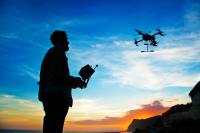With new technology comes new responsibility, and drones are no exception. The high-flying machines operate with various degrees of autonomy, serving a variety of purposes including (but far from limited to) recording aerial footage, surveilling an area, data gathering and transporting cargo.
Undoubtedly, drones are a remarkable technological achievement capable of revolutionizing everything from disaster relief to scientific research. But potentially their most controversial purpose is their recreational use. Now that you can buy a drone at Target, what risks might they present? Should anyone be able to purchase a drone, or should background checks and stricter regulations be put in place?
Currently, all drones over .55lbs—regardless of their purpose—fall under the regulations and controls of the FAA, the Federal Aviation Administration. In the same manner as any aircraft, they are required to be registered and place-carded with a registration.
This way, in case of an incident, the drone can be easily traced back to its owner.
According to KnowBeforeYouFly.org, the online registration process is simple—anyone over 13 years of age who submits his or her name, email and home address receives a Certificate of Aircraft Registration, proof of ownership and a unique identification number that must be affixed to his or her drone. Although this quick online process seems easy to skip, failure to register a drone can result in civil penalties up to $27,500, and criminal penalties can include fines up to $250,000 and up to three years in prison.
The FAA has also established “no-fly” zones specifically for drones. Across the U.S., drones are prohibited within five miles of an airport.
In New York City, they are entirely forbidden with the exception of a few designated parks. The fine for disregarding no-fly zones varies case by case.
Still, anyone can purchase and register a drone regardless of his or her criminal history. This factor is what seems to make most people uncomfortable— there is no screening process to prevent drones from getting into the hands of potentially dangerous people.
But this issue of potentially causing harm to others should be addressed in the same manner as any other aircraft, automobile or home owner, and that is through liability insurance. The concept of risk and responsibility is addressed in the insurance market. You cannot operate a car unless it is both registered and insured, and the same applies to boats, jet-skis, motorcycles, trucks, trains, etc. While requiring liability insurance may limit the recreational use of drones, it does not eliminate it.
Serious hobbyists who can afford to fly a drone retain their right to do so.There are plenty of activities that people do every day where they assume the liability for harm to others or damage to other people’s property. Take skiing, for example: when you buy a lift ticket, you sign a waiver saying that if you are injured, the owner of the ski company is not responsible, but you also agree that you understand that any damage or harm you cause to them you inflict onto others is your responsibility.
Drones should be no different. If an individual passes the requirements established by the controlling authority and assumes the liability for injury or damage resulting in the use of their drone, they should be able to purchase one without any additional checks.
Sarah Bernstein, FCRH ’17, is a communications major from Salisbury, Maryland.





